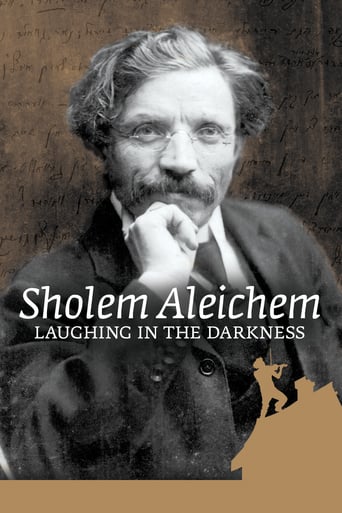

Perfect cast and a good story
... View MoreFantastic!
... View MoreA Masterpiece!
... View MoreIt's not great by any means, but it's a pretty good movie that didn't leave me filled with regret for investing time in it.
... View MoreThe delightful documentary of author Sholem Aleichem is told by Jewish historians using rare archival photos and records. The film explores Jewish culture in 19th century pre-Revolutionary Czarist Russia through the eyes of characters cleverly created by Sholem Aleichem. Protagonists such as Menahem-Mendl, Tevye the Milkman, and Mottel the Cantor's son form the basis of the acclaimed movie Fiddler on the Roof. The author brilliantly spins Yiddish tales of tradition, loyalty, and change at a time of unrest, uncertainty, and anti-Semitism.After watching the Sholem Aleichem documentary, I view Fiddler on the Roof with a deeper, more reflective perspective. I now understand the meaning of the three daughters and how change truly impacted the lives of Russian Jews. Topol played Tevye in the London stage production and Zero Mostel played Tevye in the Broadway production. After viewing Zero Mostel in his Broadway performance it was clear that Topol was the ideal choice to play God's long-suffering servant ("I know, I know. We are Your chosen people. But, once in a while, can't You choose someone else?").My favorite quote in my favorite movie is when Motel tells Tevye of his love for Tzeitel and his intention to marry her. Tevye negates this by telling him he is just a poor tailor. Motel responds "That's true, Reb Tevye, but even a poor tailor is entitled to some happiness! " This says to me that even the least among us deserves to be happy. Interestingly, Leonard Frey, the actor that depicted Motel, was a colorful personage that portrayed a gay character in the stage production and movie Boys in the Band one year before Fiddler in 1970. Sadly, Frey died of complications of AIDS in 1988. Another great voice silenced before his time.I highly recommend Sholem Aleichem: Laughing in the Darkness. It provides a thumbnail sketch of life as a Russian Jew during the late 1800's. The citizens endured turbulent and difficult lives and the movie provides yet another piece of Jewish history in the complete puzzle of life.
... View MoreThis biography and discussion of the work of Sholom Aleichem is very well made. However, you can tell that the filmmaker assumed that only Jewish people would want to watch the documentary, as MANY of the folks being interviewed talk about Jewish traditions or use Yiddish words that a non-Jewish audience would very possibly not understand. I grew up in a Jewish neighborhood and so I know about sitting shiva, shabbat and words like goyim and shtetl. But it seemed very strange that the film did not explain these things (and much more). In fact, there are probably many Jewish people who have lost contact with their Jewishness who don't understand everything these experts say. It's a shame, as Gentile audiences would benefit from learning about Sholem Aleichem as well--especially since "Fiddler on the Roof" (made up of various stories by Aleichem and starring his character 'Tevya') was a hugely popular film embraced by a wide audience, not just Jews. It's really a shame, as the documentary was otherwise exceptionally well made and interesting. Because of this, I give it a qualified recommendation.
... View MoreI first became acquainted - I don't know how - with the stories of Sholem Aleichem 50 years ago, when I was a teenager growing up in Milwaukee. After this movie got a great review in the Cleveland Plain Dealer - I wasn't able to drive up to see it - I tried to get it on DVD, which has taken almost two years. Worth the wait. A very well-done documentary about the life of this author of short stories and, evidently, novels.The one thing I wish it had explored in greater detail was the nature of Yiddish literature before SA starts to write in that vernacular. Yes, Eastern European Jews all spoke Yiddish. But how many of them could read it? Of course, young Jewish boys learned to read enough Hebrew to go through their barmitzvah, but did that familiarity with the Hebrew alphabet plus a familiarity with spoken Yiddish enable them to read Yiddish? How much of a written language had Yiddish been before SA started to write in it? That is not a fault with the movie, which I strongly recommend, just a question that struck me.
... View MoreHave you ever wondered if anyone will remember J.K. Rowling in the next century? Hard to believe that Harry Potter could ever fade from the popular consciousness and require a promulgating documentary. Case in point, Sholem Aleichem, the pen name of Solomon Naumovich Rabinovich, a renowned Yiddish author and playwright. His chosen name is a Yiddish variation the expression shalom aleichem, meaning "hello", or "peace be with you" in Hebrew.The musical Fiddler on the Roof was based on one of his many stories about Tevye the Milkman. This was the first commercially successful English-language play about Jewish life in the shtetls of Eastern Europe. Born in 1859 in the Russia Empire, Solomon Rabinovich's father was a rich merchant with a penchant for gambling. This led to the family's economic downfall. Solomon grew up to mirror his father's foibles and bring his own family to financial ruins several times. What he had going for him is his vast intelligence and passion to keep the Yiddish language alive. He used his insight into his own psychology to create characters that served as metaphors for larger Jewish cultural issues of assimilation and identity.Rabinovich's granddaughter Bel Kaufman was the author of "Up the Down Staircase", made into a popular film. Fleeing the Russian pograms and debtors his family finally settled in New York in 1914. An estimated 100,000 mourners turned out for his New York funeral in 1916.
... View More